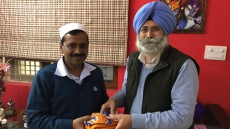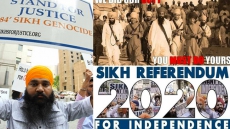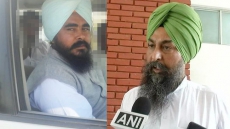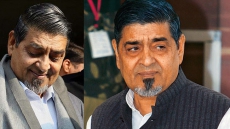Prime Minister Narendra Modi's pet 'Swachh Bharat' mission on Friday came in for sharp criticism by a top UN expert on sanitation who said it "lacked a holistic human rights approach", drawing swift reproval from the government.
The government also took exception to the United Nation's Special Rapporteur on the human rights to safe drinking water and sanitation Leo Heller's reference to Mahatma Gandhi's spectacles in the mission's logo, and his "rambling" report containing "inaccuracies, sweeping generalisations and biases".
"In the last two weeks I have visited rural and urban areas, slums and settlement camps where undocumented population is residing... and I have found that these initiatives lack a more human rights approach," he said.
A press release by the office of the High Commissioner, United Nations Human Rights, on the issue, which had a reference to Mahatma Gandhi, drew strong criticism from the government. The release was distributed at the press conference.
"Everywhere I went, I saw the logo of the Clean India Mission- (Mahatma) Gandhi's glasses. In its third year of implementation, now is a critical time to replace the lens of those glasses with the human rights lens," Heller was quoted as saying in the release.

Taking a strong note of his remarks on the logo of the Clean India Mission, the government issued a statement deploring that it showed "serious insensitivity towards the Father of the Nation".
The statement said the world knows that the Mahatma was the foremost proponent of human rights.
"Instead of taking the human rights approach to sanitation in a holistic way, a piecemeal approach is there," Heller told the press conference, and urged the government at all levels to impart a human rights perspective to its national programmes on safe drinking water and sanitation.
Heller today concluded his fortnight-long visit to the country during which he met several government officials and visited New Delhi, Kolkata, Imphal, Lucknow and Mumbai where he also visted a few slums.
The expert, charged by the UN Humans Rights Council, to monitor, report and advise on the realisation of the human rights to water and sanitation worldwide, said he also found that in certain areas people belonging to the scheduled castes and scheduled tribes faced "discrimination" in accessing toilets.

Eliminating open defecation is not just about building latrines, Heller said.
Heller said he had a "mixed perception" about the mission which was a unique initiative of India and launched by the Prime Minister himself.
"On my last day in India, the website of Clean India Mission showed 53 million toilets built in the last years, in rural areas only, (besides in urban areas). I need to recognise that it is very impressive," he said.
He also brought up the issue of the human rights of manual scavengers.
"The government's emphasis on building toilets should not involuntarily contribute to violating the fundamental rights of others, such as those specific caste groups enagaged in manual scavenging, or those who are marginalised such as ethnic minorities living in remote rural areas," he said.

The government dismissed his preliminary findings as a "rambling report" and said it contained "inaccuracies, sweeping generalisations and biases".
"The report has been produced after only a two-week visit with fleeting trips to a few states and including some anecdotal reference," the government said, asserting its "highest commitment" to human rights in general and water supply and sanitation in particular.
The UN expert, who visited India at the invitation of the government will submit a full report on his findings with recommendations at the 39th session of the Human Rights Council in September 2018.
Heller was also critical of the certification mechanism being followed while declaring a particular area open- defecation free (ODF).
"The certification procedure is not very straightforward. According to responsible ministries, the protocol to certify an ODF area is not the same for rural and urban areas. I also learned that in some places, ODF certified areas are not de facto open defecation free," he said.
Heller said the information, education and communication (IEC) mechanism used for the mission lacked proper methodology. He said just a few workshops and events were not enough for effective implementation of the mission and that sustained efforts needed to be made.
"Just dedicating funds is not enough. It is good the government has earmarked dedicated funds for the mission, but proper implementation through IEC is needed," he added.
The UN expert also said both sanitation and provision of safe drinking water should be accorded equal priority.





